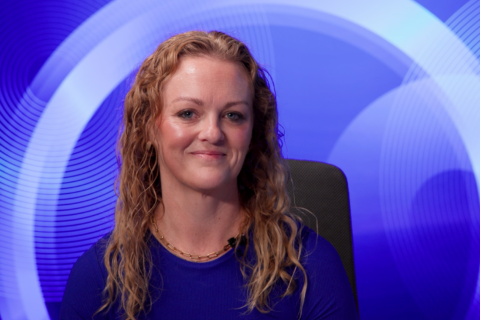This content is sponsored by PenFed Credit Union, federally insured by NCUA.
It’s important to have enough savings to navigate financial uncertainties during an economic downturn. Although general guidelines suggest saving three to six months’ worth of living expenses, the exact amount needed depends on the family or individual, monthly expenses and other sources of income.
Dual-income families should have three to six months worth of living expenses in their savings, Christopher Lyman – a certified financial planner with Allied Financial Advisors – told CNBC. Generally these earners have more flexibility and if one earner loses their job, the family could keep up with expenses through other income streams.
Single earners are typically encouraged to put away more funds than dual-income families. Lyman said households with a single earner may benefit from boosting savings to six to nine months worth of expenses.
“For both single earners and dual-income households, some advisors say it’s better to have higher cash reserves to provide more options and added flexibility in case of a job layoff,” CNBC states. “Recessions typically go hand in hand with higher unemployment, and finding a new job may not happen quickly.”
Suze Orman, personal finance expert and best-selling author, told CNBC she recommends extra savings and encourages people to have 8 to 12 months of expenses saved.
“If you lose your job, if you want to leave your job, that gives you the freedom to continue to pay your bills while you’re figuring out what you want to do with your life,” Orman said.
Experts told CNBC that retirees should have one to three years of expenses in cash. If you are retired, Brett Koeppel, a CFP and founder of Eudaimonia Wealth, said having a savings cushion is essential to stretching your funds.
“Having a sufficient cash buffer is a critical element to making your money last in retirement,” Koeppel said. “This allows you to maintain your longer-term investments without the risk of selling when the stock market is down.”
Entrepreneurs should set aside one year of savings, according to Lyman.
“Taking this advice saved quite a few of our business owner clients from shutting down due to the pandemic,” he said.
There are some options to help you save more and make the most out of your money during an economic shutdown.
Consider a high-yield savings account. This type of account lets you earn more interest on your savings.
PenFed Credit Union’s Premium Online Savings Account is a high-yield savings option that can help you keep up with the current inflation rate. You can earn a 3.00% APY and receive over six times the national average on your savings.1 You’ll also start earning dividends on the business day you initiate your deposit, which are credited to your account monthly.
Other benefits include setting up recurring transfers from your account without paying transfer fees, and no monthly maintenance fee associated with this account, allowing you to put more money back into our pocket.
However, Scott Schleicher, senior financial advisor at Personal Capital, told Bankrate that earning interest should not be the primary goal when building an emergency fund.
“Your primary goal should be to keep the money safe and liquid,” he said.
You can also save more by making an attempt to cut or negotiate your expenses wherever you can. Greg McBride, CFA, Bankrate chief financial analyst, said this could be beneficial in increasing your savings.
“The most direct pathway to increased savings often involves cutting back or eliminating certain expenses,” McBride said. “Re-evaluate your needs and your lifestyle to identify opportunities to reduce expenses.”
You can start by creating a budget to better understand your income and expenses. Then identify areas where you can decrease non-essential spending to save more each month.
McBride also said to avoid taking on extra unnecessary debt.
“Economic uncertainty is a time for reducing debt and boosting savings, not the other way around.”
Additionally, consider low-risk investment opportunities such as Certificates to maximize your money. Although this option may yield modest returns, they are generally safe during economic downturns compared to higher-risk investments.
PenFed Credit Union offers several certificate options to get your savings started. You can expect guaranteed returns, earning 5.25% APY for a one-year term2 with PenFed’s Money Market Certificates.
PenFed’s rates are subject to change, and the most recent ones can be found on its website.
Make time to learn about personal finance and investment strategies through PenFed’s online Learning Center. Bettering your financial literacy can empower you to make informed decisions, leading to higher returns on your savings.
Read more about a Premium Online Savings account and Certificates on PenFed Credit Union’s website. PenFed Credit Union is federally insured by NCUA.
- APY (Annual Percentage Yield) 3.00% is accurate as of October 1, 2023, and is subject to change at any time. Fees may reduce earnings. $5 minimum to open the account. Premium Online Savings account holders must agree to electronic delivery of account opening disclosures and monthly statements. Sourced directly from fdic.gov/resources/bankers/national-rates as of October 1, 2023.
- APY = Annual Percentage Yield. Rates are accurate as of October 5, 2023. Rates are subject to change and are fixed for the term of the certificate. Certificates dividends compound daily and credited monthly. The minimum balance to open a certificate is $1,000. Penalty will be imposed for early withdrawal. This will reduce earnings on the account. For all certificates funded by ACH, funds cannot but withdrawn within the first 60 days of the account opening. © 2023 Pentagon Federal Credit Union.





